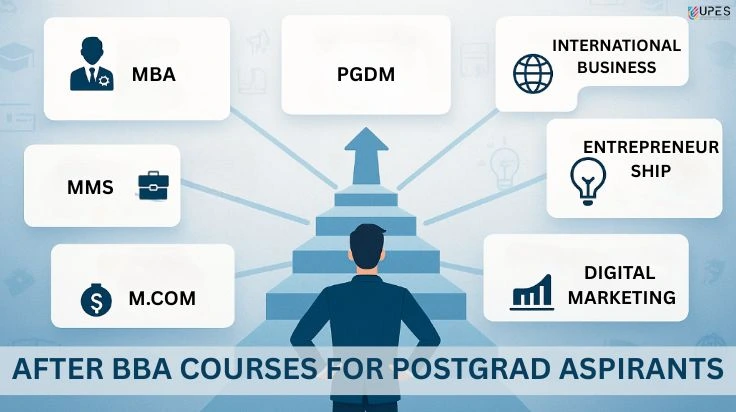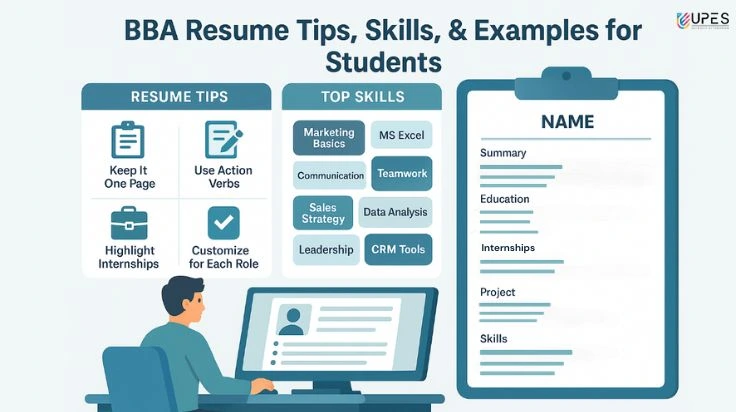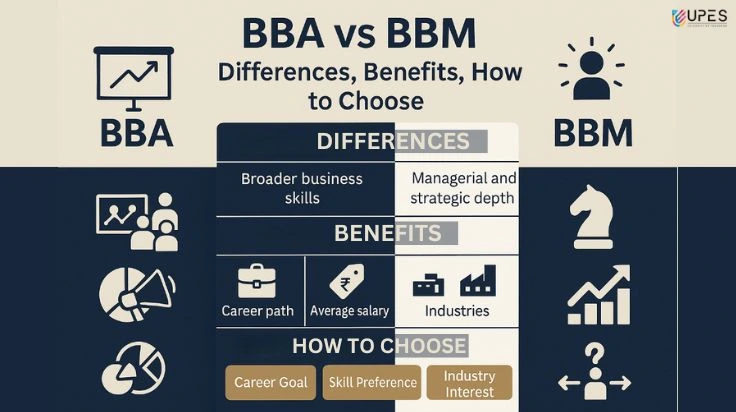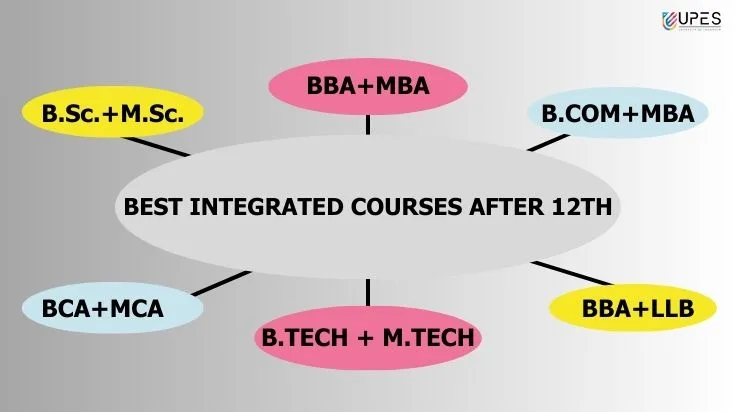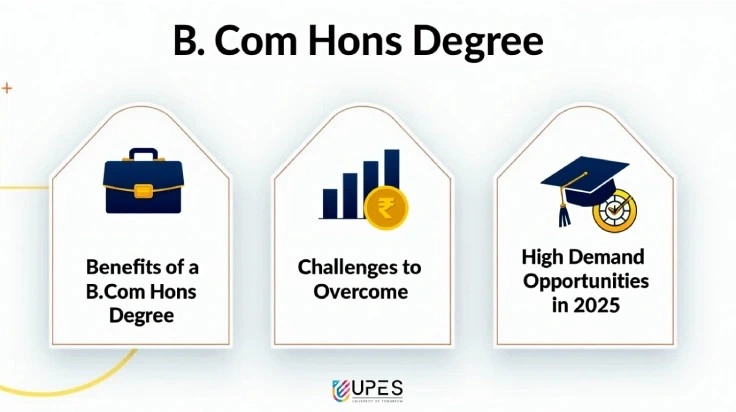Effective Study Tips for BBA Students
- UPES Editorial Team
- Published 04/03/2025

- Why Effective Study Habits Matter in BBA
- Important BBA Topics and How to Study Them
- 1. Principles of Management
- 2. Financial Accounting
- 3. Marketing Management
- 4. Business Economics
- 5. Human Resource Management (HRM)
- 6. Business Analytics
- Why Focus on These Topics?
- Top Study Tips for BBA Students
- 1. Master Time Management
- 2. Focus on Practical Application
- 3. Engage in Group Studies
- 4. Take Advantage of Technology
- 5. Practice Regular Revision
- Interesting Study Facts for BBA Students
- Common Mistakes BBA Students Make
- 1. Neglecting Soft Skills
- 2. Cramming Before Exams
- 3. Ignoring Industry Trends
- 4. Procrastination
- Conclusion
A Bachelor of Business Administration (BBA) is a dynamic program that covers a wide range of subjects essential for building a career in management, entrepreneurship, or corporate leadership. However, mastering the core topics is vital to stand out academically and professionally. Whether you aim to excel in marketing, finance, human resources, or analytics, understanding the nuances of each subject and studying them effectively can set you apart in this competitive field.
Become future-ready with our Business programs
Know MoreIf you’re looking for actionable advice, this blog will guide you through proven study tips for BBA students, common pitfalls, and answers to frequently asked questions.
Why Effective Study Habits Matter in BBA
A BBA program isn’t just about theoretical knowledge; it also focuses on practical skills like problem-solving, communication, and decision-making. By adopting effective study techniques, you can:
- Stay ahead in your coursework.
- Perform well in assignments, projects, and exams.
- Build a strong foundation for internships and career opportunities.
At UPES School of Business, the curriculum is designed to foster holistic learning, making effective study habits even more essential for success.
Important BBA Topics and How to Study Them
Understanding the core subjects of a BBA program is crucial for excelling in academics and building a strong foundation for your career. Below, we highlight some of the most critical topics in a BBA curriculum common among all BBA specializations and provide actionable tips for studying them effectively. Whether you're aiming for top grades or preparing for future job roles, mastering these subjects is essential.
1. Principles of Management
This subject introduces the fundamentals of planning, organizing, leading, and controlling within an organization.
- How to Study:
- Focus on understanding real-world examples of management principles.
- Create mind maps to relate different concepts like leadership styles, organizational structures, and decision-making processes.
- Refer to case studies from global companies like Google or Amazon to see these principles in action.
A solid grasp of management principles helps you understand the backbone of any business operation.
2. Financial Accounting
Financial Accounting lays the groundwork for understanding a company’s financial health and is a vital part of the BBA curriculum.
- How to Study:
- Start with the basics: learn accounting terminologies and concepts like journal entries, ledger, and trial balance.
- Practice numerical problems daily to strengthen your analytical skills.
- Use apps or software like Tally to get hands-on experience with accounting systems.
Mastering this subject ensures you can analyze financial data effectively, a skill highly valued in roles like financial analyst or accountant.
3. Marketing Management
This subject focuses on strategies to promote products or services and understand consumer behavior.
- How to Study:
- Keep updated with marketing trends and strategies by following platforms like HubSpot and Neil Patel’s blog.
- Create flowcharts to summarize marketing concepts like the 4Ps (Product, Price, Place, Promotion).
- Participate in online simulations or role-playing exercises to develop hands-on marketing skills.
Strong marketing knowledge opens doors to roles like Marketing Manager, Brand Strategist, and Digital Marketer.
4. Business Economics
Business Economics combines economic theory with business practices to analyze market behavior and decision-making.
- How to Study:
- Focus on graphs and models like demand-supply curves, cost analysis, and market structures.
- Follow business news to see how economic theories apply to real-world situations.
- Use online quizzes or mock tests to reinforce your understanding.
This subject is essential for roles in market analysis, consulting, and strategic planning.
5. Human Resource Management (HRM)
HRM teaches you how to manage an organization’s workforce effectively.
- How to Study:
- Read HR case studies to understand employee motivation, recruitment strategies, and conflict resolution.
- Learn about modern HR tools like SAP SuccessFactors and BambooHR.
- Participate in group discussions or role-playing to simulate HR scenarios.
Strong HR skills are critical for careers in talent acquisition, training, and organizational development.
6. Business Analytics
Business Analytics focuses on using data to drive business decisions.
- How to Study:
- Learn tools like Excel, Tableau, and Python for data analysis and visualization.
- Work on small projects or case studies to apply analytical concepts.
- Regularly practice interpreting datasets and presenting your insights.
This skill set is in high demand, especially for roles like Business Analyst and Data Analyst.
Also Read: How to Prepare for BBA Entrance Exams
Why Focus on These Topics?
Mastering these key BBA topics not only ensures academic success but also prepares you for real-world challenges. By studying effectively, you’ll build a strong foundation for a career in management, marketing, finance, or entrepreneurship.
Top Study Tips for BBA Students
Succeeding in a BBA program requires more than just attending lectures. Developing effective study habits can help you manage your time, understand complex concepts, and perform well academically. Here are some proven tips to help you excel in your BBA journey:
1. Master Time Management
Time is your most valuable asset as a BBA student. Knowing how to allocate it wisely can make all the difference.
- What to Do: Create a study schedule that allocates specific time slots for classes, assignments, and self-study.
- Why It Works: Time management prevents last-minute cramming and ensures steady progress.
- Pro Tip: Use tools like Google Calendar or Notion to plan your day.
Mastering time management not only improves your academic performance but also helps you balance extracurricular activities and personal commitments effectively.
2. Focus on Practical Application
Business is as much about application as it is about theory. Making connections between what you learn and real-world examples will enhance your understanding.
- What to Do: Link theoretical concepts to real-world scenarios through case studies, news, and industry reports.
- Why It Works: BBA is a practical program, and connecting theory to practice deepens your understanding.
- Pro Tip: Regularly read business news or follow case studies from companies like Google, Amazon, and Tesla.
This approach makes your learning more relevant and prepares you to tackle real-world challenges in your professional life.
3. Engage in Group Studies
Learning doesn’t have to be a solo effort. Collaborating with peers and faculty can help you gain new perspectives and simplify tough topics.
- What to Do: Collaborate with classmates to discuss challenging topics or share notes.
- Why It Works: Group studies encourage diverse perspectives and can simplify complex concepts.
- Pro Tip: Limit group size to 3-4 people to stay focused.
Group studies not only enhance your knowledge but also improve teamwork and communication skills, which are crucial for a successful career in business.
4. Take Advantage of Technology
Embracing technology can supercharge your productivity and streamline your studies.
- What to Do: Use apps like Evernote, Quizlet, or Trello for organizing notes, flashcards, and tasks.
- Why It Works: Digital tools enhance productivity and keep you organized.
- Pro Tip: Attend online webinars or courses to supplement classroom learning.
Leveraging technology makes studying more efficient and prepares you for the digital tools commonly used in the business world.
5. Practice Regular Revision
Revision is the key to retaining information and avoiding the stress of last-minute cramming.
- What to Do: Dedicate a fixed time each week for reviewing past topics.
- Why It Works: Revision helps retain information for the long term and reduces exam stress.
- Pro Tip: Use the Pomodoro technique to study in focused intervals.
Regular revision ensures that you stay on top of your coursework and feel confident during exams.
Interesting Study Facts for BBA Students
Studying effectively isn’t just about hard work—it’s also about using proven techniques to boost retention and focus. Here are some fascinating facts:
- Fact 1: Students who create mind maps retain 20% more information than those who rely solely on linear notes.
- Fact 2: Active recall (self-testing) boosts exam performance by 50%.
- Fact 3: Studying in a distraction-free environment improves focus and productivity by up to 40%.
Use these insights to refine your study habits and make learning more engaging and effective.
Common Mistakes BBA Students Make
While pursuing a BBA has many benefits, students often fall into certain traps that hinder their success. Recognizing and avoiding these mistakes is essential:
1. Neglecting Soft Skills
Soft skills are as important as academic knowledge in the business world.
- Mistake: Focusing only on academics without improving communication, leadership, and interpersonal skills.
- Solution: Participate in group discussions, presentations, and extracurricular activities.
Building soft skills enhances your employability and equips you to excel in team-oriented environments.
2. Cramming Before Exams
Cramming leads to stress and poor retention.
- Mistake: Trying to memorize large volumes of content at the last minute.
- Solution: Follow a consistent study schedule and revise regularly.
A well-planned approach to studying ensures better understanding and confidence during exams.
3. Ignoring Industry Trends
Staying updated on business developments is vital for a successful BBA journey.
- Mistake: Not staying updated with the latest business developments.
- Solution: Subscribe to business news platforms like Economic Times or Bloomberg.
Being industry-aware helps you relate classroom concepts to real-world scenarios and impresses recruiters.
4. Procrastination
Delaying work can lead to stress and missed opportunities.
- Mistake: Delaying assignments or projects until deadlines approach.
- Solution: Break tasks into smaller chunks and prioritize them.
Overcoming procrastination boosts productivity and ensures timely submission of high-quality work.

Our counsellors are just a click away.
Conclusion
A successful BBA journey is built on effective study habits, a proactive attitude, and the ability to adapt to challenges. By mastering time management, embracing technology, and focusing on practical applications, you can excel academically and prepare for a thriving career. Avoid common pitfalls, stay updated with industry trends, and make the most of your learning experience at the UPES School of Business.
Start implementing these tips today and set yourself up for success in your BBA program and beyond!
UPES Editorial Team
Written by the UPES Editorial Team
UPES Admission Enquiry
Subscribe to UPES Blogs
Join our community for exclusive stories, insights, and updates
By clicking the "Subscribe" button, I agree and accept the privacy policy of UPES.










